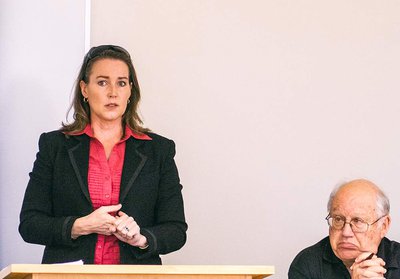
The panel was “Leisure Time, Life Satisfaction and the Environment.” The name that was added to the March 5 panel after the conference brochure came out was “Cylvia Hayes, CEO 3E Strategies, former First Lady of Oregon.”
Attendees at last week’s Public Interest Environmental Law Conference who happened to look at the PIELC 2016 addendum would have noticed that former Gov. John Kitzhaber’s fiancée was listed as a speaker alongside John de Graaf of Take Back Your Time and Randall Burtz, a professor of recreation.
Hayes said that the panel was the first time she has spoken publically about the aftermath of Kitzhaber’s resignation.
Kitzhaber stepped down in February of 2015 amid an influence-peddling scandal involving allegations that state resources were being used to help Hayes’ private consulting firm. A year later, an ongoing federal criminal probe has not produced any charges. If no charges ensue, Kitzhaber still faces investigations by the Oregon Government Ethics Commission and the Oregon Department of Justice.
Before Hayes, de Graaf spoke on his research on how shorter workdays and workweeks make for happier workers without a loss of productivity and reduces our carbon footprint. He cited studies including one by the Center for Economic and Policy Research that found cutting U.S. work time to European levels could reduce our energy use and carbon footprint by 25 to 30 percent.
Burtz then delved into what to do with the time that is gained. He argued that rather than use those extra hours for screen time — people average six to eight hours of screen time a day, Burtz said — people need to get out in the woods. The key to saving the environment, he said, is getting future generations outdoors.
Hayes said the issue of leisure time and the environment had both professional and personal aspects for her, “given what I have been through this past year.” She cited Oct. 7, 2014 — the date alt weekly Willamette Week published its exposé “First Lady Inc.” as the beginning of a “media-driven frenzy.”
Though Hayes said PIELC was her first time speaking publically, she has written of her experiences at cylviahayes.net, and her comments at the conference echoed writings on her blog that speak of “burning humiliation and shame, the terror of feeling my identity and career shattering, painful realization of how blind I have been to my own ego and a deep sense of loss and abandonment.”
She told the audience she has engaged in a “lifelong struggle to be a human being, not a human doing” and after the scandal broke she lost her clean energy work and even her colleagues.
Hayes said, “I can’t control the media, or my relationship,” adding in an aside regarding Kitzhaber, “We are doing great, by the way.” But, she said, what she can control is her time.
Hayes extolled the virtues of meditation and said that after “being forced into this unasked-for sabbatical, I could not believe how hard I had been working.” She called time a “gift” and said shifting how she prioritizes time “brought me full spiral back to my roots.”
With her return to work, Hayes says she will continue practicing meditation and not working as “hard” as she did before.
In addition to confirming that she has restarted 3E Strategies (Ecology, Economy, Equity), Hayes mentioned her work freelance writing for newly launched Issue Magazine, including a forthcoming article on oil trains. Hayes called Issue the Rolling Stone of the Pacific Northwest.
Kristy and Tina Sinsara are listed on the Oregon secretary of state’s website as members of the Issue business. Their previous publication, Level Magazine, lists among its most recent articles, “How to Have Sex Like a Porn Star” and “Does Size Matter?” as well as a piece on Cecil the lion. A January story in the Bend Bulletin delved into Kristy Sinsara’s past business dealings, including getting sued last March by singer Vince Neil of Motley Crue for allegedly refusing him access to his social media accounts when he asked after working for him as a social media consultant.
After Hayes’ talk, several audience members expressed skepticism over whether working less was a viable strategy for students with hefty student loan payments or low-wage workers.